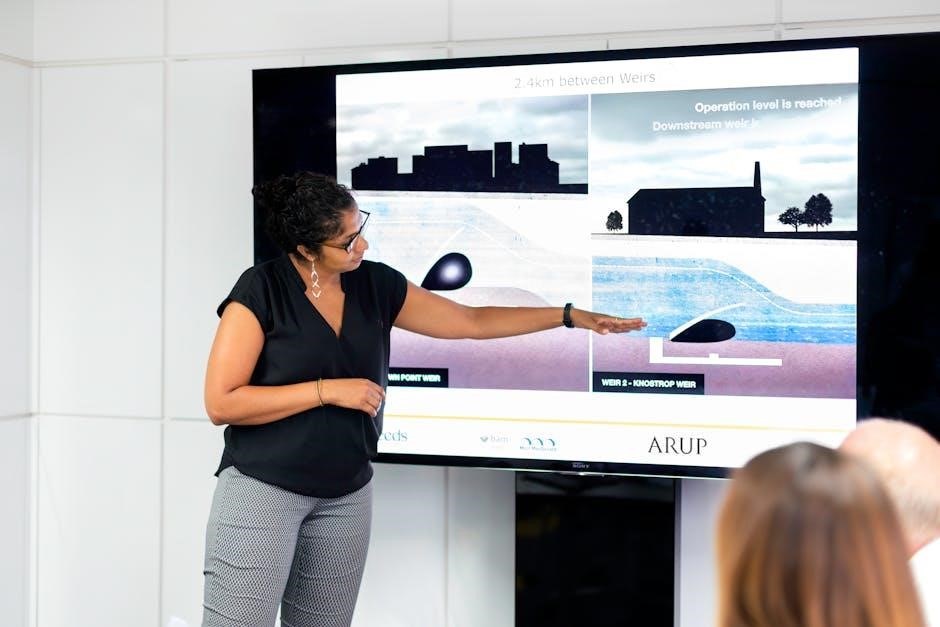Negotiation is a vital skill for achieving success in personal and professional relationships. It involves strategic communication to resolve conflicts and reach mutually beneficial agreements. Mastering this art enhances problem-solving abilities and fosters collaboration. This guide provides insights and practical strategies to refine your negotiation techniques, ensuring effective outcomes in diverse scenarios.
Definition and Importance of Negotiation Skills

Negotiation skills are the ability to effectively communicate and strategically reach agreements between parties. These skills are crucial for building relationships, resolving conflicts, and achieving desired outcomes in personal and professional settings. Mastering negotiation fosters collaboration, enhances problem-solving, and strengthens decision-making. It is essential in business, law, diplomacy, and everyday interactions, ensuring mutual satisfaction and long-term success. Developing these skills empowers individuals to navigate complex situations confidently, making them indispensable in both personal and professional life.
Overview of the PDF Guide on Negotiation Art
This comprehensive PDF guide delves into the fundamentals of negotiation, offering practical strategies and insights for mastering the art of persuasion. It explores key principles such as separating people from the problem, focusing on interests, and using objective criteria. The guide also covers advanced techniques like active listening, persuasion tactics, and conflict resolution. Designed for both novices and experienced negotiators, it provides real-world examples and actionable tips to enhance negotiation skills. By following the guide, readers can improve their ability to achieve mutually beneficial outcomes, fostering stronger relationships and ensuring successful agreements in various contexts.

Key Principles of Effective Negotiation
Effective negotiation relies on clarity, active listening, and empathy. Prioritizing mutual gains, remaining adaptable, and seeking creative solutions ensure successful and sustainable agreements.
Separating People from the Problem
Separating people from the problem is a cornerstone of effective negotiation. Emotions often escalate conflicts, making it harder to reach agreements. By focusing on the issue rather than personal attacks, negotiations remain constructive. This approach fosters mutual respect and collaboration. Understanding each party’s needs and concerns helps identify creative solutions. Neutral language and active listening are key tools to maintain professionalism and build trust. When emotions arise, acknowledging feelings without taking them personally keeps the dialogue focused on resolving the issue. This principle ensures that relationships remain intact while working toward a fair and satisfactory outcome for all parties involved.
Focusing on Interests, Not Positions
Focusing on interests rather than positions is a key principle in negotiation. While positions are the stated demands of each party, interests reveal the underlying needs, desires, and motivations. By understanding these, negotiators can uncover creative solutions that satisfy both sides. For example, in a business dispute, one party may demand a specific payment, while their deeper interest is financial stability. Addressing the interest rather than the position can lead to mutually beneficial outcomes. This approach encourages open dialogue, builds trust, and fosters collaboration, making it easier to reach sustainable agreements that fulfill the core needs of all parties involved.
Using Objective Criteria
Using objective criteria in negotiation involves relying on facts, data, and established standards to support arguments and decisions. This approach helps parties reach fair and reasonable agreements by focusing on verifiable information rather than emotions or personal biases. Objective criteria, such as market rates, legal standards, or expert opinions, provide a neutral foundation for discussion. By referencing these benchmarks, negotiators can build credibility, reduce conflict, and create solutions that are grounded in logic and evidence. This method fosters transparency, accountability, and mutual satisfaction, making it a cornerstone of effective negotiation strategies in both personal and professional contexts.

The Negotiation Process
Negotiation involves structured phases: preparation, opening discussions, exploring options, bargaining, and reaching agreements. Each step requires strategic communication to achieve mutually beneficial outcomes effectively and efficiently.
Preparation and Planning
Effective negotiation begins with thorough preparation. Research the counterpart’s needs, interests, and limitations to identify potential common ground; Define clear objectives and alternative solutions. Gather relevant data and evidence to support arguments. Anticipate possible obstacles and develop strategies to address them. Establish a strong opening position while remaining flexible. Practicing active listening and empathy can also enhance understanding. A well-structured plan ensures confidence and direction during discussions, ultimately increasing the likelihood of a successful outcome. Preparation is the foundation for achieving desired results in any negotiation scenario.

Opening the Negotiation
Opening a negotiation sets the tone for the entire discussion. Begin by creating a comfortable environment, fostering trust, and establishing a positive rapport with the counterpart. Clearly state the purpose and goals of the meeting while encouraging open dialogue. Use positive language to frame discussions constructively. Active listening is crucial to understand the other party’s perspective and build mutual understanding. Avoid aggressive statements and instead focus on collaborative problem-solving. A well-executed opening can create a foundation for productive exchange and increase the likelihood of reaching a favorable agreement. First impressions matter, so approach the conversation with confidence and respect;
Exploring Options and Bargaining
Exploring options and bargaining are critical stages in negotiation where creative solutions are developed. Focus on generating mutually beneficial proposals while understanding the counterpart’s priorities. Use open-ended questions to uncover hidden interests and expand the scope of possibilities. Bargaining involves tactical exchanges, such as making offers, counteroffers, and concessions; Maintain a collaborative tone to prevent deadlock and ensure transparency in discussions. Leverage objective criteria to justify positions and seek compromises that satisfy both parties. Effective bargaining balances assertiveness with empathy, fostering a win-win outcome and strengthening relationships for future interactions. Adaptability and creativity are key to navigating this dynamic phase successfully.
Reaching an Agreement
Reaching an agreement requires balancing interests, ensuring clarity, and securing mutual satisfaction. Both parties should feel confident in the terms, fostering long-term trust and cooperation. Summarize key points to avoid misunderstandings and confirm that all needs are met. Be prepared to make final adjustments while maintaining fairness; A well-crafted agreement reflects compromise and respect, laying the groundwork for future collaborations. Ensure all commitments are clear and actionable, creating a foundation for successful implementation. Finalize the deal with professionalism and positivity, celebrating the shared success and reinforcing the relationship.
Advanced Negotiation Techniques
Mastering advanced techniques like active listening, persuasion, and conflict resolution enhances negotiation outcomes. Employing empathy and influence strategies fosters collaboration, ensuring mutually beneficial solutions and stronger relationships.
Active Listening and Empathy
Active listening is a cornerstone of effective negotiation, enabling deeper understanding of the other party’s needs and concerns. By truly hearing and acknowledging their perspective, negotiators build trust and rapport. Empathy allows for emotional connections, which can diffuse tensions and create a collaborative environment. Techniques include maintaining eye contact, nodding, and paraphrasing to show understanding. This approach not only gathers valuable information but also fosters mutual respect, making it easier to find creative solutions that satisfy both parties. Mastering these skills can significantly enhance negotiation outcomes and long-term relationships.
Persuasion and Influence Tactics
Persuasion and influence are powerful tools in negotiation, enabling parties to shape outcomes favorably. Tactics like emotional appeals, logical arguments, and reciprocal gestures can sway opinions. Using data and evidence strengthens credibility, while storytelling connects on a personal level. Timing is crucial—striking when the other party is most receptive. Influencing without coercion fosters trust and long-term collaboration. These strategies, when applied ethically, enhance negotiation success and build lasting relationships.
Handling Objections and Conflict
Handling objections and conflict requires finesse and emotional intelligence. Active listening and empathy are essential to understand the other party’s concerns. Remaining calm and composed helps de-escalate tensions. Acknowledge the issues without taking them personally, and focus on finding mutually beneficial solutions. Open communication and transparency build trust, while creative problem-solving turns conflicts into opportunities. Using objective criteria can help resolve disputes fairly. Effective conflict management not only resolves the immediate issue but also strengthens relationships, ensuring long-term collaboration and success.

Case Studies and Real-World Applications

Case studies illustrate practical negotiation strategies in business and diplomacy. They highlight successful techniques, lessons learned, and industry-specific approaches. Real-world examples demonstrate how adaptability and cultural understanding lead to favorable outcomes, while failed negotiations reveal common pitfalls to avoid. Analyzing these scenarios enhances negotiation skills and prepares individuals for diverse challenges.
Successful Negotiation Examples in Business
Business negotiation success often hinges on strategic approaches. For instance, Apple’s ability to secure favorable supplier terms by emphasizing long-term partnerships exemplifies effective deal-making. Similarly, Google’s negotiations in cross-border mergers highlight the importance of cultural sensitivity and aligning interests. These cases demonstrate how separating people from problems and focusing on mutual benefits can lead to win-win outcomes. By employing active listening and creative solutions, businesses foster trust and achieve sustainable agreements. Such examples underscore the value of preparation, empathy, and adaptability in reaching profitable and enduring deals in competitive markets.
Lessons Learned from Failed Negotiations
Failed negotiations often stem from poor communication, emotional decision-making, or unrealistic expectations. For instance, ignoring the other party’s needs can lead to stalemates. Lack of preparation and rigid positions are common pitfalls. Additionally, cultural misunderstandings or misinterpreting interests can derail discussions. Analyzing these failures highlights the importance of active listening, flexibility, and separating emotions from logic. Learning from these mistakes fosters resilience and improves future negotiation strategies, emphasizing the value of empathy and creative problem-solving to bridge gaps and achieve mutually satisfying outcomes.
Cultural and Ethical Considerations

Cultural differences and ethical practices play a crucial role in negotiations. Understanding diverse communication styles and values ensures respectful and fair interactions, fostering trust globally.
Cultural Differences in Negotiation Styles
Cultural differences significantly influence negotiation styles, shaping communication, expectations, and behaviors. In some cultures, directness and assertiveness are valued, while others prioritize harmony and indirect communication. For example, in the U.S., negotiations often focus on achieving a “win-win” outcome, whereas in more hierarchical cultures like Japan, building trust and respect is paramount. Understanding these differences is crucial for effective cross-cultural negotiations. Being aware of varying time perceptions, decision-making processes, and emotional expressions can help bridge gaps. Empathy and flexibility are key to navigating diverse negotiation approaches and fostering successful outcomes in global interactions.
Ethical Dilemmas in Negotiation
Ethical dilemmas in negotiation arise when parties face conflicts between achieving goals and maintaining moral standards. Issues like honesty, transparency, and fairness often come into play. For instance, withholding information or using manipulative tactics can lead to short-term gains but harm trust and long-term relationships. Navigating these challenges requires a commitment to integrity and mutual respect. Practicing active listening, setting clear boundaries, and seeking solutions that benefit all parties can help resolve ethical conflicts. Striking a balance between assertiveness and empathy is essential for maintaining ethical negotiation practices and fostering sustainable outcomes.
Technology and Tools for Modern Negotiation
Modern negotiation leverages digital tools like AI and machine learning to analyze data, predict outcomes, and enhance preparation. These technologies streamline communication and improve decision-making efficiency significantly.
Digital Tools for Negotiation Preparation
Digital tools have revolutionized negotiation preparation by offering advanced analytics and strategic insights. Platforms like Negotiation Analytics Pro and Negotiation360 enable users to assess opponents, predict behaviors, and simulate scenarios. These tools utilize AI to evaluate historical data, identify patterns, and recommend optimal approaches. Additionally, collaboration software like NegotiationHub facilitates real-time document sharing and communication, streamlining pre-negotiation planning. Virtual reality (VR) tools even allow practitioners to rehearse negotiations in immersive environments, enhancing confidence and adaptability. By integrating these technologies, negotiators can enter discussions better prepared, with data-driven strategies and a deeper understanding of stakeholder dynamics.
The Role of AI in Negotiation Analysis
AI plays a transformative role in negotiation analysis by leveraging machine learning to predict outcomes and identify patterns. It analyzes vast datasets from past negotiations to provide insights into opponent behaviors and preferences. AI tools can evaluate proposals in real-time, suggesting optimal strategies and potential concessions. Natural Language Processing (NLP) enables AI to interpret emotional cues and tone, aiding in rapport-building. While AI enhances efficiency, it doesn’t replace human intuition but rather complements it, ensuring data-driven decision-making. This synergy between technology and human skills revolutionizes negotiation dynamics, making processes more informed and effective.
